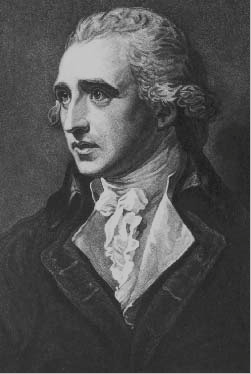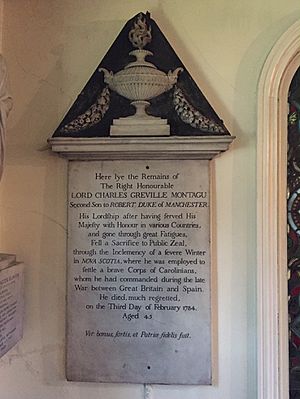Lord Charles Montagu facts for kids
Quick facts for kids
Charles Montagu
|
|
|---|---|

Lord Charles Montagu, South Carolina Governor
|
|
| 29th Governor of South Carolina | |
| In office June 12, 1766 – May 1768 |
|
| Monarch | George III |
| Preceded by | William Bull II |
| Succeeded by | William Bull II |
| In office October 30, 1768 – July 31, 1769 |
|
| Monarch | George III |
| Preceded by | William Bull II |
| Succeeded by | William Bull II |
| In office September 15, 1771 – March 6, 1773 |
|
| Monarch | George III |
| Preceded by | William Bull II |
| Succeeded by | William Bull II |
| Personal details | |
| Born | 1741 |
| Died | 3 February 1784 Guysborough, Nova Scotia (community) |
| Spouse |
Elizabeth Balmer
(m. 1765) |
| Parents | Robert Montagu, 3rd Duke of Manchester Harriet Dunch |

Lord Charles Greville Montagu (1741 – 3 February 1784) was an important British leader. He was the last Royal Governor of the Province of South Carolina from 1766 to 1773. During this time, William Bull II also served as governor for a few periods. Lord Montagu also led a group of soldiers called the Duke of Cumberland's Regiment during the American Revolutionary War.
Contents
Who Was Lord Charles Montagu?
Early Life and Family
Charles Montagu was born in 1741. He was the second son of Robert Montagu, 3rd Duke of Manchester. In 1759, Charles went to Oxford University. He married Elizabeth Balmer in 1765. Before becoming a governor, he was a Member of Parliament for Huntingdonshire from 1762 to 1765. This meant he helped make laws in Britain.
Governor of South Carolina
Lord Montagu became the Governor of South Carolina in 1766. This was a challenging time because of growing tensions between Britain and the American colonies.
The Stamp Act and Colonial Unrest
One big problem was the Stamp Act of 1765. This was a British law that put a tax on many printed items in the colonies, like newspapers and legal documents. People in the colonies were very unhappy about this tax. Lord Montagu tried to make the colonists happy by pardoning some of the Regulators. The Regulators were a group of people who wanted fairer government and less corruption. Even with these efforts, he remained unpopular with many colonists.
Role in the American Revolution
The disagreements between Britain and the colonies eventually led to the American Revolutionary War. Lord Montagu played a part in this conflict.
Leading the Duke of Cumberland's Regiment
During the war, Lord Montagu started recruiting soldiers for the Duke of Cumberland's Regiment. He tried to get American prisoners to join his regiment to fight for the British. These soldiers were meant to fight against Spanish forces, who were helping the American colonists.
He was captured while trying to recruit soldiers on British prison ships in New York. However, General Nathanael Greene, an American leader, released him. Lord Montagu even tried to convince American General William Moultrie to join his side, but he was not successful. Lord Montagu and his soldiers formed the Duke of Cumberland's army regiment. This group of soldiers was officially ended in 1783, after the war.
Later Life and Legacy
After the war, Charles Montagu moved to Halifax, Nova Scotia, with his family. His regiment, the Duke of Cumberland's, settled in a place called Guysborough.
Lord Montagu died on February 3, 1784, when he was still in his 40s. He is buried in the crypt (an underground room) of St Paul's Church in Halifax. People remembered him as a brave and good person who was very loyal to his King and country.
Lasting Tributes
- A street in Charleston, South Carolina is named Montagu Street, after him.
- Cumberland Street in Charleston, South Carolina, is named after Montagu's regiment.

